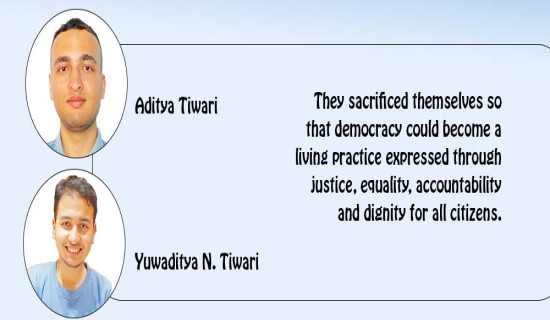- Friday, 30 January 2026
Ensuring Women’s Right To Health
The government of Nepal has promulgated Right to Safe Motherhood and Reproductive Health Act, 2018 to give effect to Article 38 of the Constitution which details a long list of fundamental rights for women populace. In this context, Article 38 is a welcome piece of law with valuable human rights about how Nepal created its feminist national policy under the constitutional framework, how it changed from top-down policy to becoming part of entire socio-political landscape and the outcome it has reaped.
The provision confers ample rights on women that include women’s equal right to lineage without any gender discrimination; right relating to safe motherhood and reproductive health; right to special opportunity in education, health, employment and social security on the basis of positive discrimination; and both spouses’ equal rights in property and family affairs.
Constitutional provisions
It is structured to enhance women’s ‘rights’, ‘reproduction’ and ‘resources’ in every aspect of national life. The constitutional arrangement is couched in a language with the objective of mainstreaming women, ending organised inequalities between men and women in each of the three ‘Rs.’ Still, the fourth R-the ‘reality’ where women live, which is a key to feminist movement, is yet to be dealt with. In this regard, the preamble of Right to Safe Motherhood and Reproductive Health Act, 2018 envisages ensuring safe motherhood and reproductive health to every woman in a dignified and easily assessable way. But, there are some of the provisions which have potential to frustrate the objective the legislation has intended to achieve.
Section 7 (3) of the Act provisions that if a government hospital fails to ensure treatment to a patient, it should refer the patient to other better government hospital and if the patient’s treatment is not possible in government hospitals, then in such case the patient should be referred in private hospital. This provision in one or some other way clarifies that private hospitals in Nepal are more well-equipped or advanced than the government hospitals. If the service at government hospitals is good, patients would not be compelled to seek treatment in private hospitals.
This Act is silent about ensuring the availability of latest equipment, consultant doctors, or highly standard medical treatment (in government hospitals) on a par with the international standard. Indeed, patients should be referred in private hospitals in case government hospitals fail to ensure treatment at their disposal.
Similarly, Section 13 of the Act allows 98-day paid maternity leave to every woman. The provision is applicable in all government, non-government and private institutions. The leave could be granted once — either before or after delivery. The benefit cannot be used by a woman for a period extending up to certain weeks before the expected delivery date and the remaining weeks after the childbirth. More so, if a woman exhausts her right by taking a 98-day pre-delivery leave, then she is bound to take unpaid leave afterwards. In such a situation, how could a woman, who is a single breadwinner of her family, secure the best interests of her health and her baby’s health?
On the contrary, the Act does not provide any clear provision suggesting that on whom — either employer or employee — the ultimate power or right lies in deciding or availing the leave. The law in force does not slam the exercise of (arbitrary) discretionary power of employer. In doing so, the state fails to limit the monopoly of employers in deciding the philosophy of paid maternity leave. The law does not make the employer duty bound to uphold the best interest of their female employees.
Further, Section 13 (3) provisions for a designated place for breast-feeding in every office. But, the enforcement agencies are little serious to implement this provision in letter and spirit. Unfortunately, there are handful numbers of non-government and government offices in Nepal that have made arrangements for designated place for breast-feeding. The legal framework demands that one should knock the door of the law court at the instance of violation of his/her fundamental right. However, seeking remedy from court is a complex process in itself. It’s often said that justice delayed is justice denied. In Nepal, disposal of cases is at a snail’s race and justice delayed is so common here.
Section 32 (3) directs the private hospitals to charge easily assessable fees. But, the Act does not contain any explanation as to what constitutes ‘assessable’ fees. So, what’s the yardstick to determine if the fee is easily assessable or hardly assessable? The private hospitals may interpret any sum of fees as assessable fee.
Section 22 envisages for the allocation of budget. But, the provision does not provide the basis of budget allocation. The law does not incorporate provision as to how budget would be allocated — i.e., if it’s on the report of provincial governments or hospitals or local bodies or any authentic study. Section 22 (1) provides that the federal government would allocate budget. In this way, the law confers ample power on the centre to apply its discretion while allocating budget. It favours centralising tendencies of the government in a federal democracy.
Maternal deaths
Over and above it all, the status quo, where quality health services, including safe motherhood, could not be availed in government hospitals leaves women insecure and it frustrates the fundamental rights of women secured under the constitution itself. As a matter of fact, the factors resulting in maternal deaths include women’s poor health before pregnancy; inadequate, inaccessible or unaffordable healthcare; and poor hygiene and healthcare during the time of childbirth. Socio-economic realities such as poverty and women’s unequal access to resources also play major role in maternal deaths. This Act contains nothing as such to control and limit the maternal deaths and to address the concerns of poor and needy ones.
This Act shows liberal attitude towards the private hospital mafias and little seriousness towards safe motherhood and reproductive health. Still, if our laws are implemented in letter and spirit, Nepal would be a step ahead in right direction in upholding the cause of medical democracy.
(Jha is a Section Officer at Janakpur High Court, Birgunj Bench.)

















